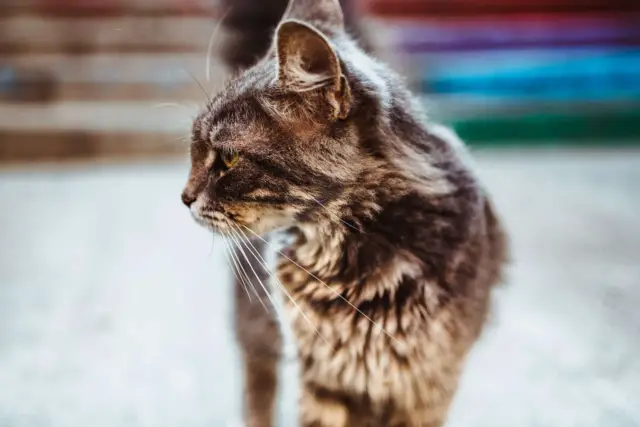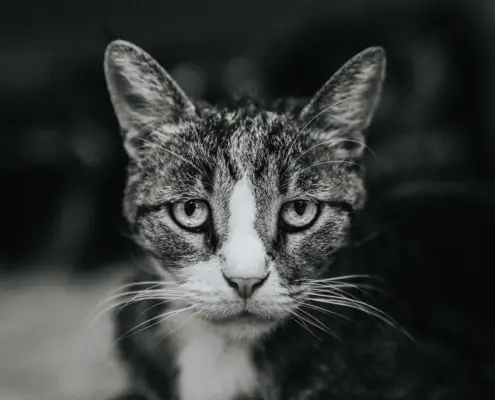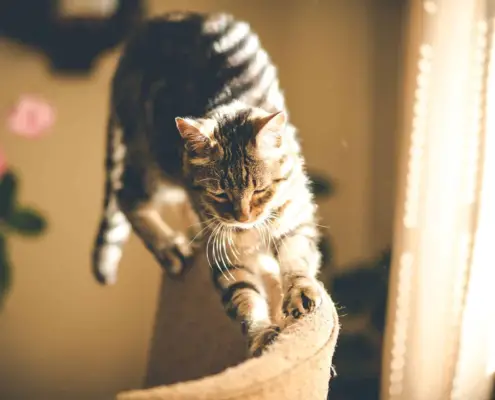
Cats have long captivated the hearts and imaginations of humans with their mysterious and independent nature. Each cat seems to possess a unique personality that sets them apart from one another. But where do cats get their personalities from? This article delves into the origins of feline individuality, exploring the various factors that contribute to a cat’s distinct personality.
Genetics and feline personalities
Genetics play a significant role in shaping a cat’s personality. Just like humans, cats inherit certain traits and characteristics from their parents. Researchers have found that certain genes are associated with specific behaviors and temperaments in cats. For instance, some cats may be more prone to aggression or shyness due to their genetic makeup.
However, it is important to note that genetics alone do not determine a cat’s personality entirely. While certain traits may be predisposed, other factors also come into play in shaping a cat’s unique personality.
The role of early experiences in shaping a cat’s personality
Early experiences play a crucial role in shaping a cat’s personality. Kittens who receive proper socialization during the critical period of their development are more likely to grow up to be confident and well-adjusted cats. Exposing kittens to various stimuli, such as different people, animals, and environments, helps them develop their social skills and adaptability.
On the other hand, kittens who do not receive adequate socialization may develop fear, anxiety, or aggression towards unfamiliar situations or individuals. These early experiences lay the foundation for a cat’s personality and can have a lasting impact on their behavior throughout their lives.
Environmental factors that influence a cat’s personality
Apart from genetics and early experiences, environmental factors also play a significant role in shaping a cat’s personality. The environment in which a cat grows up and lives can greatly influence their behavior and temperament. Factors such as the presence of other animals, the availability of resources, and the overall household environment can all impact a cat’s personality.
For example, a cat who lives in a calm and quiet household with minimal stressors is more likely to be relaxed and laid-back. On the other hand, a cat living in a chaotic and unpredictable environment may develop heightened anxiety or aggression as a way to cope with the constant stimuli.
The impact of socialization on a cat’s personality
Socialization is a crucial aspect of a cat’s development and plays a significant role in shaping their personality. Socialization refers to the process of exposing a cat to a variety of people, animals, and experiences in a positive and controlled manner. By socializing with your cat from a young age, owners can help them develop into well-rounded and confident individuals.
A cat that is properly socialized is more likely to be friendly, outgoing, and adaptable. They are comfortable being handled, enjoy the company of humans and other animals, and are less likely to exhibit fear or aggression in unfamiliar situations. Socialization is an ongoing process, and even adult cats can benefit from gradual exposure to new experiences.
The unique personalities of different cat breeds
Cat breeds are known for their unique personalities and traits. While individual variations exist within each breed, certain characteristics are more common among specific breeds. For example, the Siamese breed is known for being vocal and affectionate, while the Maine Coon is often described as gentle and friendly.
Understanding the typical personality traits of different cat breeds can help potential owners choose a cat that aligns with their lifestyle and preferences. However, it is important to remember that every cat is an individual, and there can be variations even within a particular breed.
How to understand and appreciate your cat’s individuality
Every cat is a unique individual with their own personality quirks and preferences. Understanding and appreciating your cat’s individuality is key to building a strong bond and providing them with the best care possible. Here are a few tips to help you better understand and appreciate your cat’s individuality:
- Observe and learn: Spend time observing your cat’s behavior and body language. Notice what makes them happy, anxious, or excited. By paying attention to their cues, you can gain insights into their preferences and needs.
- Respect their boundaries: Cats, like humans, have their own boundaries. Respect their personal space and avoid forcing them into uncomfortable situations. Allow them to approach you on their terms and provide them with safe spaces where they can retreat when needed.
- Provide enriching experiences: Cats thrive on mental and physical stimulation. Offer a variety of toys, scratching posts, and interactive play sessions to keep them engaged and entertained. This not only helps prevent boredom but also allows them to express their unique personalities.
- Tailor their environment: Cats are sensitive to their surroundings. Create an environment that caters to their individual needs. Provide hiding spots, vertical spaces, and cozy resting areas to accommodate their unique preferences.
Tips for nurturing and strengthening your cat’s personality
Just like humans, cats can benefit from ongoing personal growth and development. Here are some tips for nurturing and strengthening your cat’s personality:
- Positive reinforcement: Use positive reinforcement techniques, such as treats and praise, to reward desired behaviors. This helps encourage positive traits and strengthens the bond between you and your cat.
- Training and mental stimulation: Cats are highly intelligent creatures and enjoy mental challenges. Teach them new tricks, engage them in puzzle toys, or introduce clicker training to keep their minds sharp and active.
- Bonding activities: Spend quality time with your cat engaging in activities they enjoy. Whether it’s playing with a favorite toy or grooming them gently, these bonding moments help nurture their unique personality and strengthen your relationship.
- Health and well-being: Ensure your cat’s physical and emotional needs are met. Provide a balanced diet, regular veterinary care, and a safe and comfortable living environment. A healthy and content cat is more likely to display their true personality.
Common misconceptions about feline personalities
There are several common misconceptions about feline personalities that need to be addressed. One of the most prevalent misconceptions is that cats are aloof and unaffectionate. While some cats may be more independent than others, many cats are loving and enjoy companionship.
Another misconception is that a cat’s personality is fixed and unchangeable. While certain traits may be more ingrained, cats are capable of learning and adapting throughout their lives. With patience, understanding, and positive reinforcement, you can help your cat develop new behaviors and overcome any challenges they may face.
Celebrating the unique personalities of our feline friends
Cats are fascinating creatures with individual personalities that make them truly unique. While genetics, early experiences, and environmental factors all contribute to a cat’s personality, it is important to remember that every cat is an individual. By understanding and appreciating their unique traits, we can strengthen our bond with our feline friends and provide them with the love and care they deserve.
So, the next time you observe your cat’s playful antics or enjoy a quiet snuggle session, take a moment to celebrate their distinct personality and the joy they bring into your life.
If you enjoyed my article, I would appreciate you sharing it with your network.

Sima Ndlebe
Sima writes for CatBuzz. He is interested in Cats, Health and Fitness, and Entrepreneurship.
Published: 25 May 2024




